The pursuit race is the ultimate battle of man against the clock and, in the end, man against man. Once upon the time the pursuit champion was the king of the boards and everyone would know his name. Australian Steele Bishop was one of those men of the ’80s.
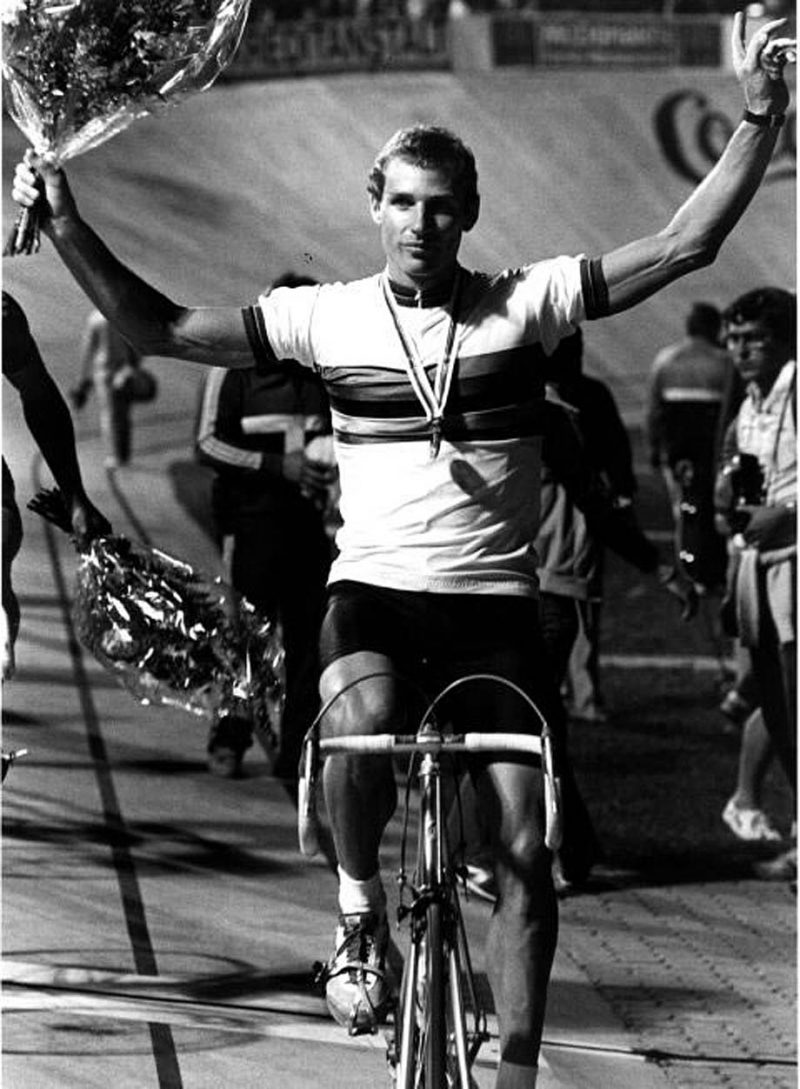
When I first got ‘into’ cycling, back in 1970, if the World Professional Road Race Champion wasn’t riding but the World Professional Pursuit Champion was, then the track man was entitled, nay, duty bound to wear his rainbow jersey – that’s how important the title was.
Things have changed, since 1993 the championships have been ‘open’ so there’s now no distinction between amateurs and professionals, all ride the 4,000 meter distance. Before then the Pros rode 5,000 meters. No longer do the big road stars and real specialists who used the title as a big bucks calling card into the Six Days line up for the pursuit.
The late 60’s up to the mid 70’s was the time of Great Britain’s Hugh Porter and Belgium’s Ferdi Bracke rivalry; with the rest of the 70’s seeing big power houses like Dutchmen, Roy Schuiten and Bert Oosterbosch, Germany’s Gregor Braun and Italy’s Francesco Moser lift the title. The 80’s was the period of another British pursuiter, Tony Doyle’s rivalry with Danish perfectionist, Hans Henrik Oersted. They were the ‘big two’ in the event for much of the decade.
But in 1983, a name appeared on the roll of honor which had results anoraks like me scratching our heads, Steele Bishop of Australia. But if we’d studied the pursuit results from previous years closely then we’d have known that this was the big Australian rider’s third serious Worlds campaign and on both previous occasions he’d made the last eight.
In 1983 he thought he’d retired but circumstances put him on a plane to Zurich with the thoughts firmly in his mind that this would be his last ‘Worlds’ and only gold would be good enough.
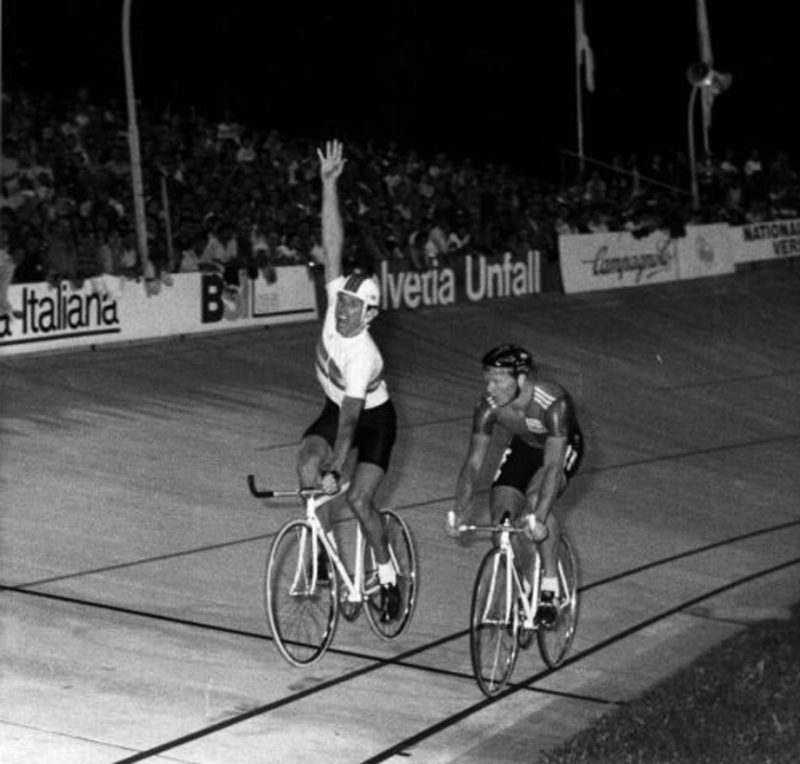
You rode the 1972 Olympics, it was 1983 when you won the Worlds – that’s a long while, Steele?
“I was the youngest cyclist at those Games in Munich at 19 years-of-age; I’d actually set my sights on Olympic selection for 1976 but we’d achieved a qualifying time – despite the crap bike that I was riding – in the team pursuit so the Federation decided to send a team.
“I’d moved from West Australia to Melbourne which was Aussie Cycling ‘Heartland’ where the best riders were so as I could train and compete at a higher level.
“When I look back, my aim was to represent Australia, not actually win anything.”
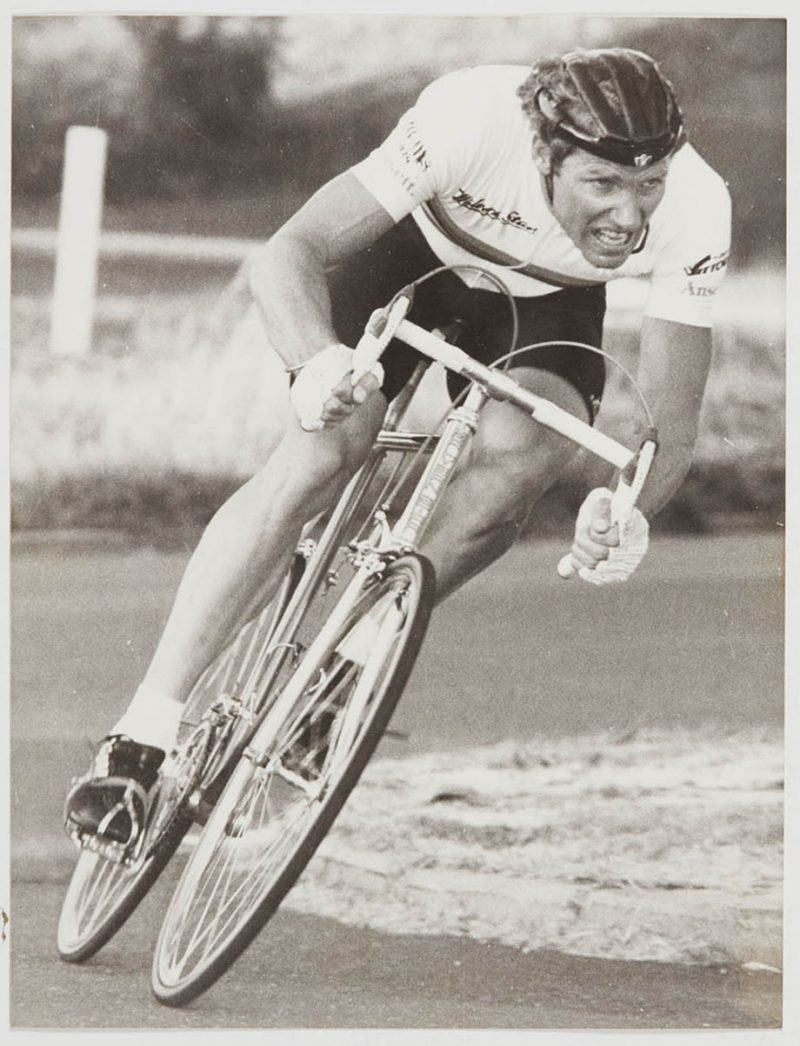
You rode the ’73 amateur Worlds in San Sebastian too?
“I was 20 years-old and headed off to The Netherlands to race and prepare for the Worlds. I was riding the criteriums three times each week and making the top 20, that brought in around $150 dollars; back in Australia the average wage was about $90/week and if you won a race you’d get a $20 money order to a bike shop.
“I was really looking forward to the Worlds and was psyched up for it but when I got down there the first event on the program was the amateur pursuit qualifying.
“And I was first starter, on the track on my own against the watch…
“I had been offered a contract with the Peugeot-Michelin amateur team in The Netherlands for the 1974 season but had to return to Australia due to my visa situation.
“I’d realized my goals in representing Australia at the Olympics and Worlds but hadn’t set myself a goal to be on the podium – there wasn’t enough input on the mental aspect.”
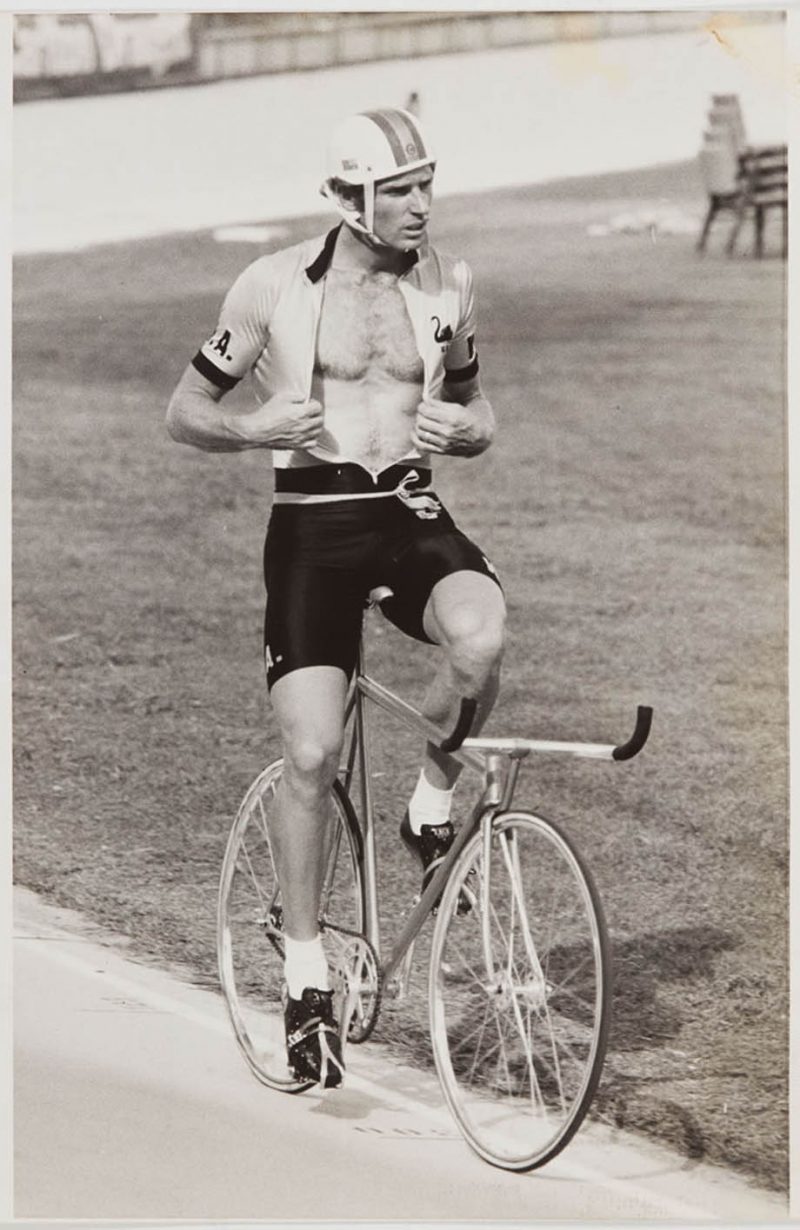
Then you turned professional back home?
“I quit the sport but then came back as a pro four months later, it was the money that lured me back to the sport.
“Each year I’d win one or two national titles; a total of 13 with eight pursuit titles. In that time I took the national 5,000 meters record from 6:25 down to 5:51.
“But it wasn’t until one year when my coach, Ken Benson said to me; ‘you know Steele, if you’d ridden five seconds faster over the five kilometers you could have won the Worlds?’ I’d ridden 6:07 and the Worlds was won with a 6:02.
“Ken’s words took me back to when I was 13 years-old, sitting on the step of my house reading the results of the Tour de France in the Saturday morning newspaper and dreaming that I wanted to be the best in the world one day.
“Ken ignited that boyhood dream which now turned into my goal. I decided to set that as my goal, adopt a ‘can do’ attitude and frame a strategy.
“I put a team together – my cycling coach, a physical coach for the swimming pool and gym, a dietician, a mental coach, a mechanic and masseur with my wife as manager.
“I also had a chiropractor to deal with my bad back, they worked with me through four national pursuit titles and my three Worlds campaigns.
“But whilst I had a mechanic, I’d check every bolt on the bike before each ride, and the tires too – the ultimate responsibility was mine.”
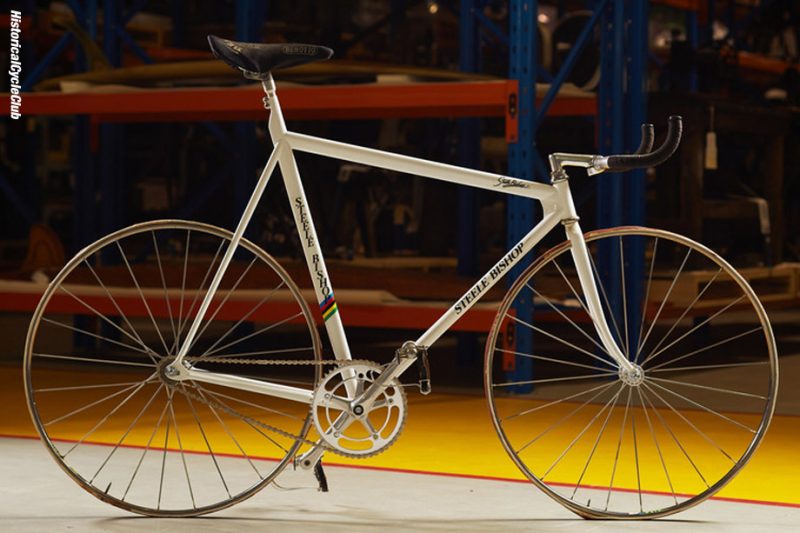
Brno, Czechoslovakia 1981 was your first pro Worlds?
“As part of my build up I rode some of the post-Tour criteriums with the big names – that was a fantastic experience.
“To do specific preparation for the Worlds I went to Switzerland but I went down with bronchitis.
“My nutritionist took me down to the hospital and they gave me a huge shot of vitamin C and I came good within a week.
“But then on the train on the way to the championships I went down with bronchitis again.
“I qualified sixth fastest but Oosterbosch beat me in the next round – Alain Bondue of France took the title.”
Then it was rainy Leicester, England in ’82 for the Worlds.
“Yeah, the weather was terrible for training, what I should have done was to take the plane to Switzerland where the weather was much better.
“I was up against England’s Sean Yates in the quarters and the noise of the cheering for Yates was deafening; he was up on me all the way buy I came late and beat him – you could have heard a pin drop!
“But I went out to Oersted in the next round – I was devastated… Bondue beat Oersted in the final.”
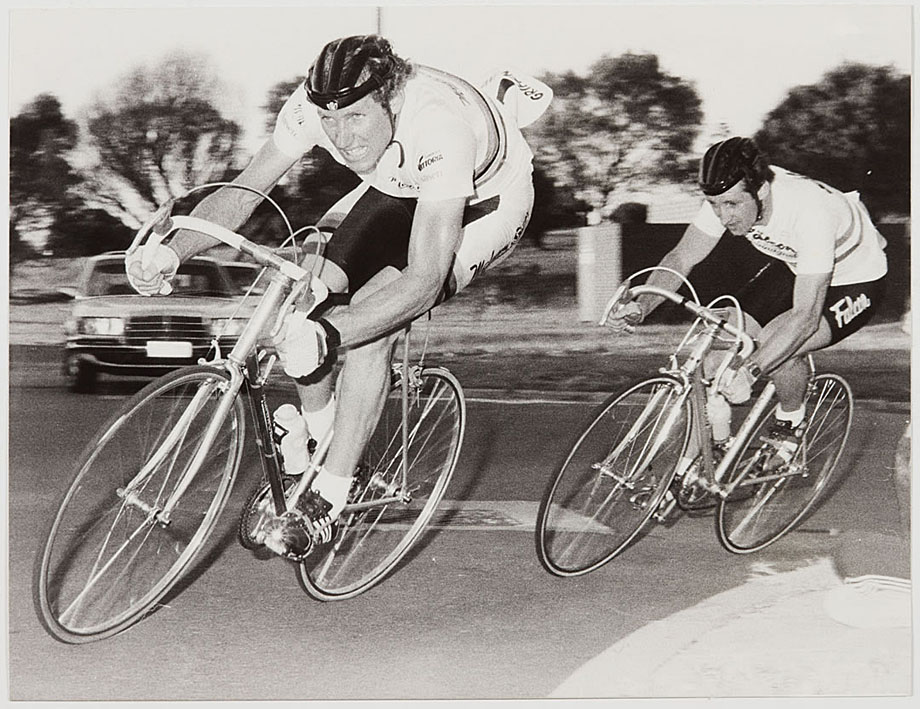
Your road to Zurich and gold had a departure point you didn’t expect…
“For two-and-a-half years, seven days a week I’d tried to win the Worlds but couldn’t do it; I decided to ride the National Champs then that would be me finished.
“After the Nationals there was a ceremony for what they called the ‘Oppy Oscars’for the best ride by an Australian that year [Sir Hubert Opperman was a legendary cyclist from the 1930’s who rode the Tour de France and set many long distance records, ed.] and I won for my taking the national five kilometers record below six minutes for the first time.
“The prize was a plane ticket to the Worlds in Zurich. Shit!
“I took two weeks off and decided to give it one more go. I put my team back together and we traveled to Switzerland.
“I arrived in Europe 10 weeks before the champs and prepared by riding track meets, 15 Coca-Cola criteriums in Germany and three Kellogg’s town centre criteriums in England.
“I qualified fasted in 5:51:55 with home rider and 1980 Olympic Champion, Robert Dill-Bundi second fastest with 5:57:53.
“The reigning champion, Alain Bondue of France had withdrawn so there were only seven starters, this meant they went straight to the semis with no quarters.
“Bondue said he fell off his bike going back to the hotel and broke his wrist. I found out later that the only thing broken was his spirit, when he saw the time I rode, apparently he didn’t have great form that year.
“In the semis I beat Doyle 5:53 to 5:59 and Dill-Bundi 5:58 beat Oersted by 19/100ths. So it was Dill-Bundi and me in the final.”
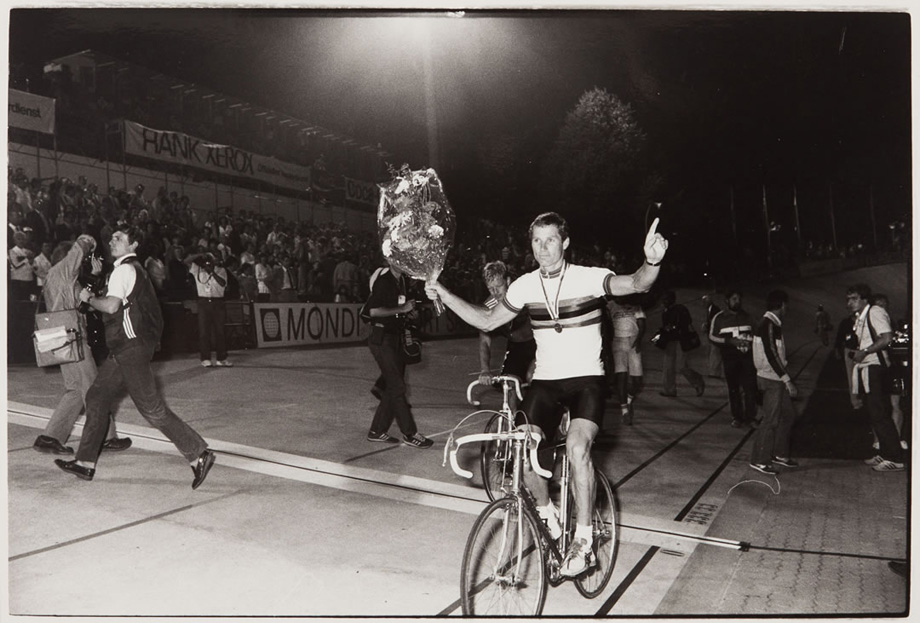
I read you had a couple of visitors before the final?
“When I was a young cyclist, for years I had a picture on my wall of the Aussie rider, Philip Bristow-Stagg on my bedroom wall, he was silver medalist in the Commonwealth Games Kilometer Championship in Jamaica in 1966.
“I was on the massage table when we heard the door knock.
“This small guy with a beard walked in, he didn’t look like a bike rider and he said; ‘I was in Belgium on business and read you’d reached the final so came down to see you win, my name is Phil Bristow-Stagg.’
“I still get goose bumps when I tell that story, as it shows the power of the written goal or putting a picture up of something you want.
“Then there was another knock, it was Dill-Bundi.
“We’d been training together so I knew him well. He sat on the end of the table and said; ‘Steele, tomorrow you head back to Australia but I must win because I need that rainbow jersey to get contracts for the Six Days, this winter.’ I just replied; ‘Robert, I must win too. . .’ He stood up and said; ‘I understand’ and left the room.
“In the bronze ride off Oersted beat Doyle 5:53 to 6:04 but the Dane’s ride was slower than my slowest.
“The final went to plan and I caught Dill-Bundi just before the four kilometer mark. I was Champion of the World; boyhood dream fulfilled.
“I’d read in one of the papers in the build up to the race that Dill-Bundi when asked, who were his main rivals, he said the men to beat were Doyle, Oersted and Bondue, when the journo mentioned my name, he said; ‘he’s only good for two kilometers!’ He’d only ever seen me do two kilometer efforts in training.
“When we were in the control waiting to give our samples after the final I put my arm around Robert and said; ‘That wasn’t bad for a guy who’s only good for two K!’ We both had a little laugh.”
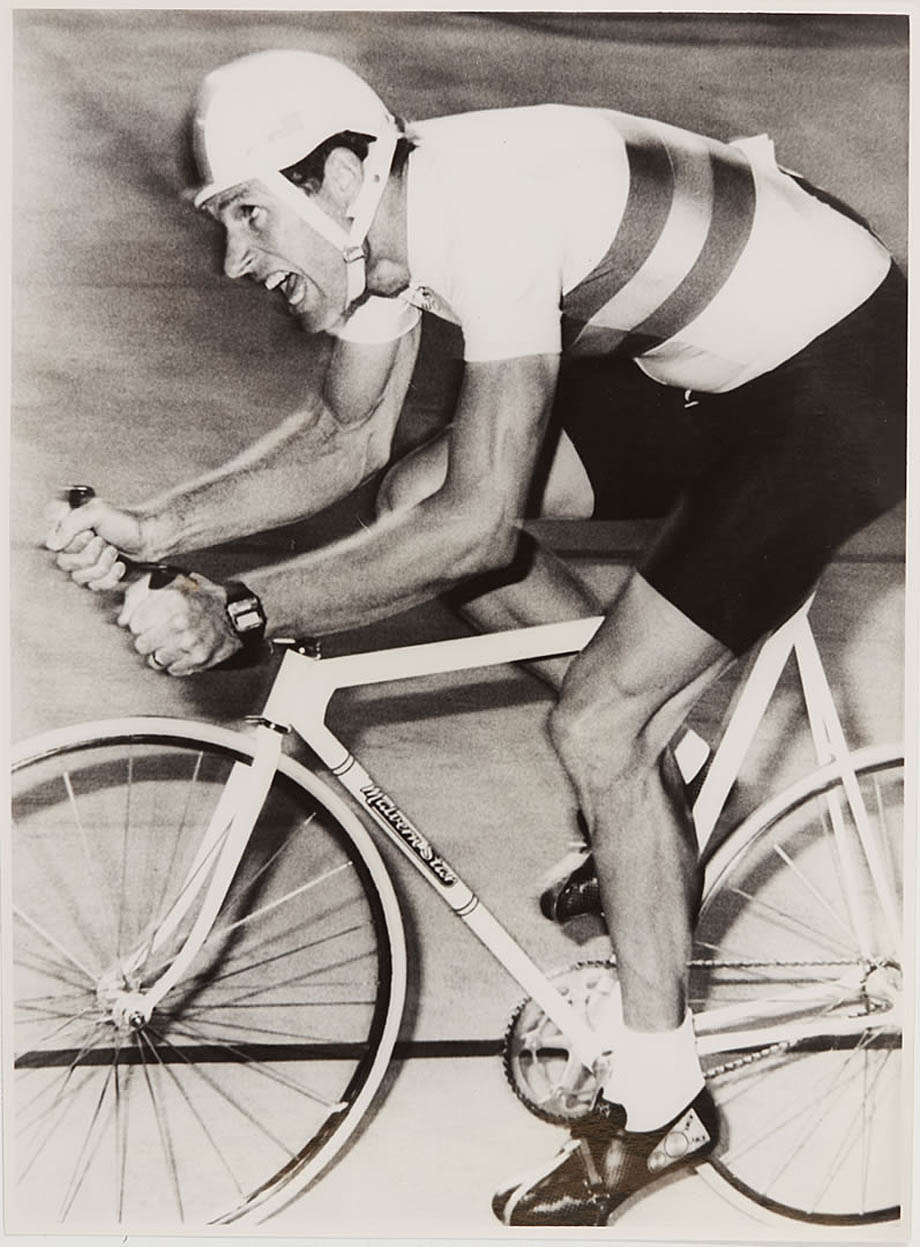
… and I know what your next question is!
Oh yeah?
“Why didn’t I stay in Europe, take advantage of my rainbow jersey and ride the Six Days or go to Mexico to chase world records?
“I knew that I could ride a dozen or more Six Days at $10,000 per contract but I also knew that guys charged up to ride the Sixes.
“I’d seen it when I rode the Coca-Cola crits in Germany.
“And it wasn’t about the money for me, I’d achieved my boyhood dream and in the fashion I’d wanted: convincingly.
“You see, I wanted to prove to myself that I was the best in the world, if I had only just won, as Bondue did the two previous years, then I would have come back the next year to prove to myself that I was the best. When Bondue won his titles it was by a whisker, but I’d caught my opponent in the final – and he was a very worthy opponent.”
And you were a fireman all through your career as a pro?
“I’d train in the day then do a night shift; if there were no call-outs then I could sleep and I paid guys to take shifts for me if I needed days for training or racing.
“After winning the Worlds in 1983 I made the last 12 of the West Australia Sportsman of the Year and was interviewed on TV; I said that I was knocked-back on my application to have six month leave without pay from the fire brigade to go back to Europe and finish my cycling career as a World Champion…
“When it came time for the Premier of West Australia to announce the winner, on direct TV broadcast, he started by saying that any fireman that wants leave without pay to go back to Europe, can have it.
“Then he announced me as the winner.
“The next week the Chief Officer of the Fire brigade called me into his office and said that he had been directed by the Premiers Department to give me my leave.
“As it turned out I decide to spend my last seven months before retiring by giving my Australian sponsors the exposure they deserved and raced all over Australia before winning my last race being the Westral Wheel Race on my home track in front of my home supporters.”
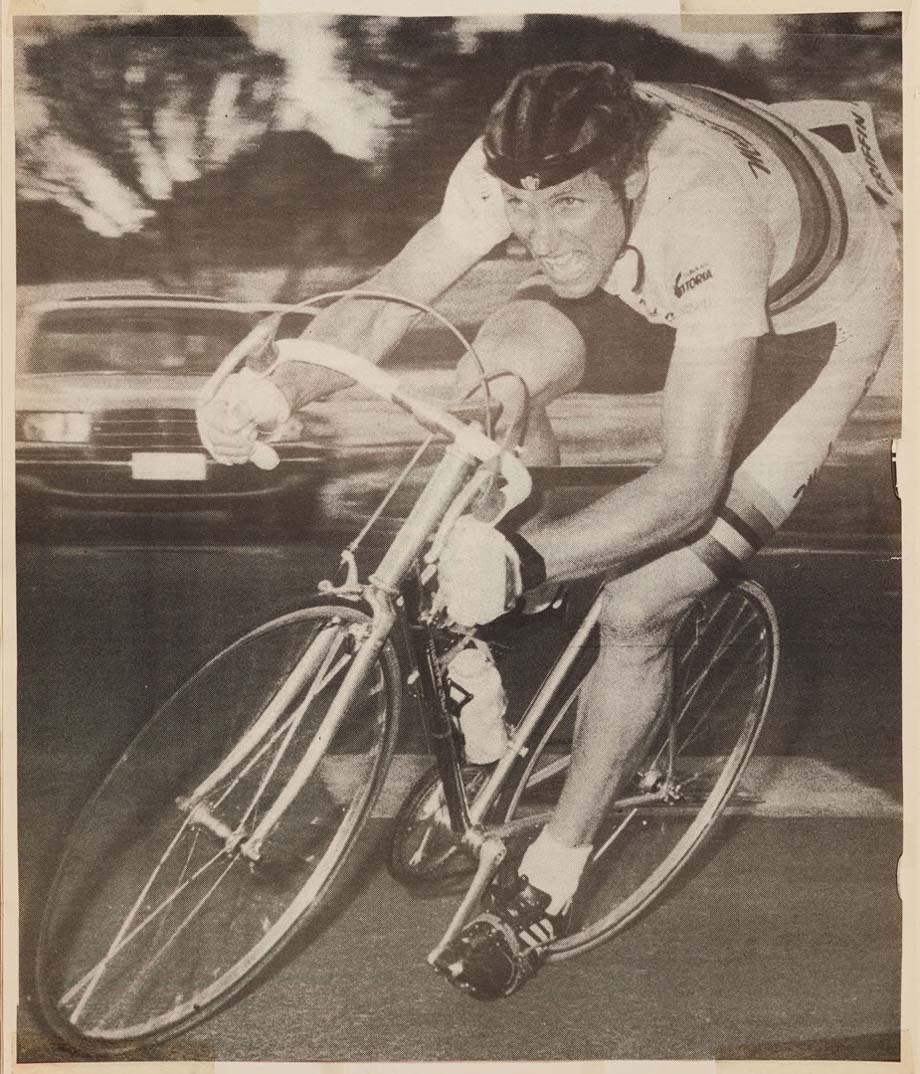
Tell us about your training.
“All of my training was at 100%.
“For instance, when I did standing start practice I’d do it as if it was under race conditions.
“Every second day I did 160 kilometers on the road, on the days between I’d do three hours plus a session in the swimming pool or gym, resistance training.
“We did stretching, work on my balance, coordination and muscle groups other than the ‘pure’ cycling ones. The theory was that in that last kilometer of the pursuit it wasn’t just down to the cycling muscles, the muscle groups around the cycling muscles would be able to provide support.
“Charlie Walsh was the Aussie team track coach at the time and he had his guys down to 8.5% to 11.0% body fat; I was on 4.8% just skin, muscle and bone.”
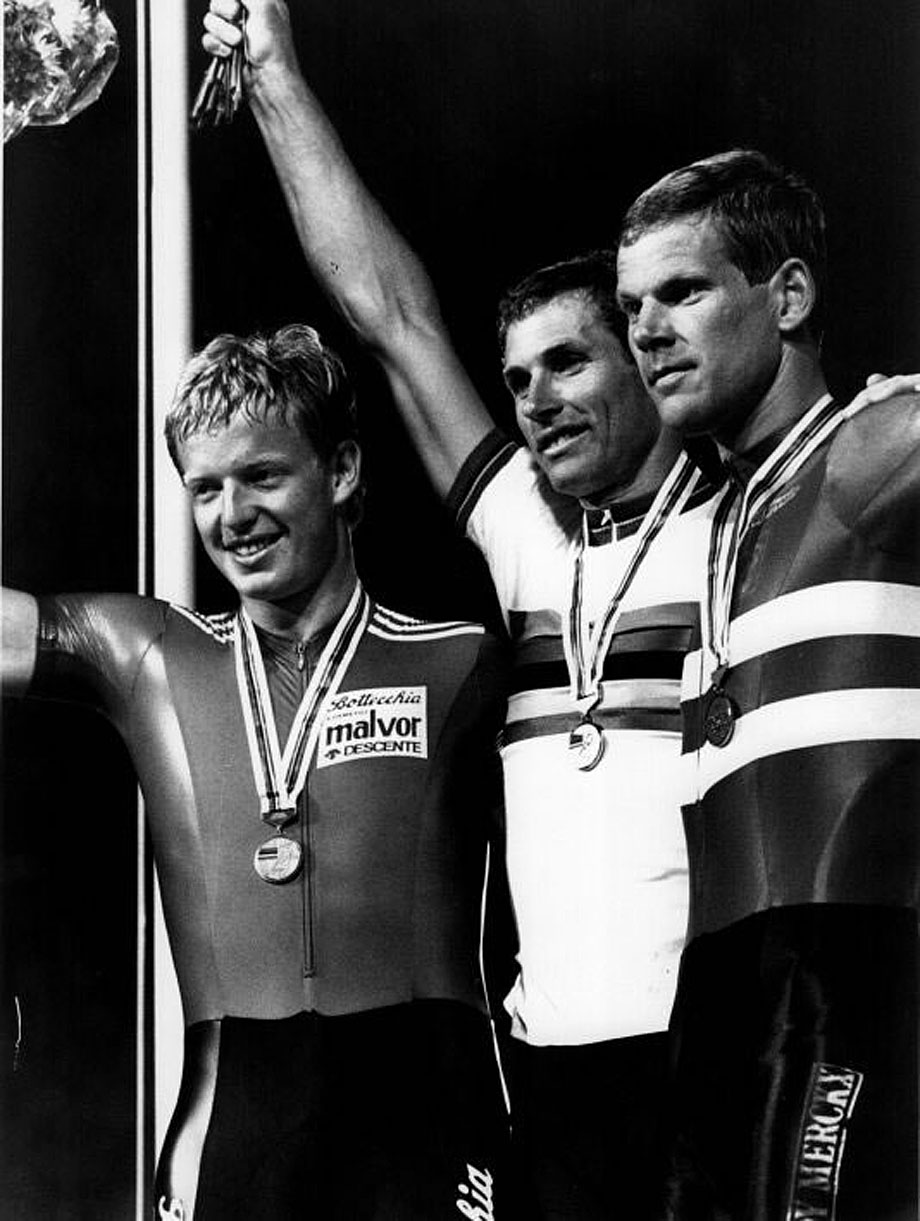
Any Regrets, Steele?
“I think if I’d won it that first year then I wouldn’t have been as strong – the losses make you stronger, that’s how you learn.
“And when you do win, there’s that real sense of gratitude…”
With thanks to Steele for his time, you can catch his website at steelebishop.com.au and check out our review of his autobiography, ‘Wheels of Steele’.



